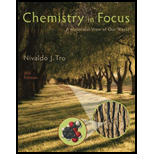
Concept explainers
Billions of pounds of urea,
By assuming unlimited amounts of CO2, how many moles of urea can be produced from each of the following amounts of
Interpretation:
The number of moles of urea is to be determined in the given amounts of
Concept introduction:
The characteristic mass of a compound is the formula mass of the compound, which is obtained by adding the atomic masses of all atoms.
A conversion factor is a numerical ratio, which is used to change one unit into another.
The chemical formula represents the precise number of atoms in a molecule, but not their structural arrangement.
Answer to Problem 54E
Solution: The number of moles of urea present in the molecules is given as follows:
Explanation of Solution
a)
The equivalence is obtained between moles of
In order to obtain the moles of urea, the conversion factor proceeds as follows:
Therefore, the number of moles of urea is
b)
The equivalence is obtained between moles of
In order to obtain the moles of urea, the conversion factor proceeds as follows:
Therefore, the moles of urea are
c)
The equivalence is obtained between grams of
The equivalence is obtained between moles of
In order to obtain the moles of urea, the conversion factor proceeds as follows:
Here,
Therefore, the moles of urea are
d)
The equivalence is obtained between grams of
The equivalence is obtained between moles of
In order to obtain the moles of urea, the conversion factor proceeds as follows:
Here,
Therefore, the moles of urea are
Want to see more full solutions like this?
Chapter 4 Solutions
Chemistry In Focus
- When talking about the acidity of carboxylic acids, is it the same thing to say higher or stronger acidity?arrow_forwardUsing the following two half-reactions, determine the pH range in which $NO_2^-\ (aq)$ cannot be found as the predominant chemical species in water.* $NO_3^-(aq)+10H^+(aq)+8e^-\rightarrow NH_4^+(aq)+3H_2O(l),\ pE^{\circ}=14.88$* $NO_2^-(aq)+8H^+(aq)+6e^-\rightarrow NH_4^+(aq)+2H_2O(l),\ pE^{\circ}=15.08$arrow_forwardIndicate characteristics of oxodec acid.arrow_forward
- What is the final product when hexanedioic acid reacts with 1º PCl5 and 2º NH3.arrow_forwardWhat is the final product when D-galactose reacts with hydroxylamine?arrow_forwardIndicate the formula of the product obtained by reacting methyl 5-chloro-5-oxopentanoate with 1 mole of 4-penten-1-ylmagnesium bromide.arrow_forward
 ChemistryChemistryISBN:9781305957404Author:Steven S. Zumdahl, Susan A. Zumdahl, Donald J. DeCostePublisher:Cengage Learning
ChemistryChemistryISBN:9781305957404Author:Steven S. Zumdahl, Susan A. Zumdahl, Donald J. DeCostePublisher:Cengage Learning Chemistry: An Atoms First ApproachChemistryISBN:9781305079243Author:Steven S. Zumdahl, Susan A. ZumdahlPublisher:Cengage Learning
Chemistry: An Atoms First ApproachChemistryISBN:9781305079243Author:Steven S. Zumdahl, Susan A. ZumdahlPublisher:Cengage Learning
 Chemistry & Chemical ReactivityChemistryISBN:9781133949640Author:John C. Kotz, Paul M. Treichel, John Townsend, David TreichelPublisher:Cengage Learning
Chemistry & Chemical ReactivityChemistryISBN:9781133949640Author:John C. Kotz, Paul M. Treichel, John Townsend, David TreichelPublisher:Cengage Learning Chemistry for Engineering StudentsChemistryISBN:9781337398909Author:Lawrence S. Brown, Tom HolmePublisher:Cengage Learning
Chemistry for Engineering StudentsChemistryISBN:9781337398909Author:Lawrence S. Brown, Tom HolmePublisher:Cengage Learning Chemistry: Principles and PracticeChemistryISBN:9780534420123Author:Daniel L. Reger, Scott R. Goode, David W. Ball, Edward MercerPublisher:Cengage Learning
Chemistry: Principles and PracticeChemistryISBN:9780534420123Author:Daniel L. Reger, Scott R. Goode, David W. Ball, Edward MercerPublisher:Cengage Learning





